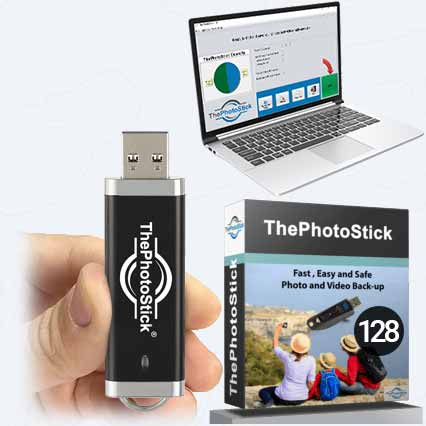summary
The photo stick backup system is a USB-like device, that helps users harmlessly backup their files. The photo stick seems like any other USB drive at first glance and has a similar function in assisting the storage. Continue reading
prREACH
Haxtun, Colorado, Sep 29, 2020 /prREACH/ -- Technology has made the collection of memories uncomplicated. It wasn’t long ago that families required cameras to capture the precious moments of their lives. And it's a fact that people want to summarize their entire travel history onto their picture albums. But obviously, there is never enough space for so many memories. A single click can capture hundreds of memories in smartphones. With phones, capturing moments has been made fun and serene, but many struggle to keep those unlimited images secured and keep a proper backup if they get lost or stolen. Anyone who likes to capture every moment of their adventures but doesn't know how to back up all their precious photos, the creators of ThePhotoStick™ say they have a perfect solution to this problem.
For more information about ThePhotoStick™ and to read customer reviews, please visit http://www.link-manage.com/k.
This device has been built with the utmost simplicity and made it extremely simple to control. Users need only connect it to their systems like they would any USB device and begin utilizing it. There are no complex startup instructions, and users don’t have to follow complex processes to identify and organize all their images.
Compact and lightweight, Photo Stick is a very small, useful device that can be used even while traveling, similar to a USB drive. Universal Serial Bus (USB) is a fabrication caliber that benchmarks specifications for cables and connecting devices and protocols for connection, communication, and transmission (interfacing) between computers, outlets, and other computers. ThePhotostick™, on the other hand, comes with preinstalled software to back up files and save them in the time automatically it took to read this.
When attached to a computer, the pre-installed program on the photo stick forages all the system files and specifically picks out files for backup. In juxtaposition to any other drive, the media files automatically get transferred, and the device does not require any assistance individually. The device functions by itself and is accomplished in this task. Photo Stick doesn't need much labor because it does its job autonomously once it is configured. The main contrast between a flash drive and Photostick is that it is an ultra-portable accommodation device with a desegregated USB interface. Simultaneously, Photostick is a flash memory storage device with mobility advantage used with sustenance devices.
Once it has been connected, the photo stick device runs the commands independently and without any assistance. It'll begin looking for images, photos, and all media files on the computer. It also scans all the records and moves them from users' devices easily. Everything is done without user feedback. The photo stick also sorts out the duplicate files and skips the doubles. The device scans the entire system and even detects the files that users were unaware of or lost in the system.
The photo stick works well for both pictures and videos and can also sort and create a backup of documents. The device has spontaneous functions so that even people who are not tech-savvy can use it well.
The Photostick can read all format media files. In addition to the general media file sorts, it can also scan and store MOV and MPEG4 formats; users can backup and restore any file extension to correctly organized directories with the photo stick. Users can even search and back up old photos and videos burned for safekeeping on CDs.
Once users have already used a photo stick, any files still in use and backed up in the Photo Stick are overlooked, and only new files are copied. It saves storage space and saves users from the task of individually checking what files to copy. The photo stick can perform all the tasks alone.
PhotoStick has now released three different sizes of flash drives. It comes in 8 GB, 64Gb, and 128 GB versions. Everybody can store all their media files easily. The 128 GB version offers an unprecedented capacity that caters to the needs of even those working as professional photographers who want to back all their files up.
Up to 3,500 pictures are contained in the 8 GB model, and videos and documents can also be contained. Video files are, of course, larger than images. About 30,000 photos can be easily held on the 64 GB drive. There is amazing storage of 60,000 images in the 128 GB edition. All of these can also be used for the storage of videos and documents.
The manufacturer suggests that most consumers would do well with the smaller 8 GB capacity of pictures. This size is optimal for users who take casual photos. The bigger sizes are for customers who are professional photographers or have a keen interest in clicking pictures. They have an abundance of photos to fetch and stockpile cautiously on their device. The best picture stick plus edition with 1 TB memory is also available for those wanting even more storage.
This system offers a reliable backup of all images, videos, and even a substantial amount of files. Since the photo stick is detached manually from the device and stored apart, its contents are completely protected against hackers. Users can disable the Internet connection and safely backup their files to dodge the risk of interference. The data is also protected from electrical disruption, crashed hard disk, and virus threats.
PhotoStick reviews from happy users show that it is user-friendly and protects all media files from every phone or tablet. The device received 4.5 out of 5 stars, according to the company. Some users also said the app could locate the very old media files they thought were lost.
Those interested in finding out more about ThePhotoStick™ should visit the product's official website at https://getphotostick.io/.
###

